Best Places in Portugal for Digital Nomads
June 11, 2025
Portugal has become one of the most sought-after destinations for digital nomads – and not by accident.
With its mild climate, accessible visa programs and relatively lost cost of living, the country offers a rare combination of lifestyle and practicality for remote workers looking to settle in Europe.
But beyond the obvious perks, what really sets Portugal apart is its diversity of options and locations. From Lisbon’s tech-savvy energy to Porto’s creative pulse or the slow-paced life of Madeira and the Azores, Portugal offers an impressive range of choices.
Still, with choice comes complexity. It’s one thing to visit somewhere for a day or even a week of sunshine and sightseeing – but it’s quite another to live and work there full-time.
Infrastructure, internet speed, co-working options, housing availability, banking facilities and levels of bureaucracy can vary wildly. One person’s ‘best Portugal’ is another person’s worst.
As ever, following the herd – or taking your cues from someone’s social media highlight reel – is likely to lead to disappointment, frustration and, potentially, higher costs.
Choosing the correct Portuguese base takes more than guesswork. It requires clarity on your needs and potential compromises, as well as understanding what kind of environment is necessary to support your work and lifestyle goals.
The good news? Portugal has something for just about every type of remote worker.
The bad news? Not every spot will suit your particular needs.
That’s why the Nomad Capitalist team has put together this guide to Portugal’s top digital nomad destinations. Whether you’re going for a season or planning to stay long-term, this is what you need to know in order to go where you’re treated best.
Benefits of Portugal for Digital Nomads
Beyond the picturesque postcards and holiday snapshots, Portugal offers a high standard of living. World-class food and excellent leisure options complement the country’s rich culture, with options for every taste.
Portugal is about substance as much as style.
Portugal’s position between Europe, Africa, and the Americas’ time zones gives nomads a competitive edge, as it allows them to avoid scheduling phone calls across continents at unmanageable hours.
Of course, lifestyle and location mean little if the fundamentals aren’t sound. Thankfully, Portugal scores well here.
Expect widespread access to reliable high-speed fibre-optic internet – the absolute bedrock for any effective remote work setup. This is complemented by well-connected international airports and growing business support services.
While prime areas in Lisbon and the Algarve naturally command higher prices, Portugal generally has a far more affordable cost of living than other competing locations.
Lastly, taxation is always a key piece of the digital nomad puzzle.
Now, it’s true that Portugal’s well-known Non-Habitual Resident (NHR) tax regime has closed its doors to new applicants from the start of 2024. However, don’t mistake that for the end of tax advantages. The landscape has shifted, but attractive possibilities remain.
In Portugal, expats are taxed based on their residency status. Portuguese residents are taxed on their worldwide income, and non-residents are taxed solely on Portuguese-sourced income.
For more information, see our guide to tax in Portugal for expats. But ultimately, if you structure things properly, you can save big on taxes as a digital nomad in Portugal.
What is Portugal’s Digital Nomad Visa Pathway?
The Portuguese digital nomad visa permits non-EU/EEA/Swiss nationals who are employed or self-employed with entities outside of Portugal to legally reside and work in the country.
However, what sets Portugal apart from many countries with this type of visa is that it has two distinct possibilities.
Firstly, there’s the temporary stay pathway. This is suitable for shorter stints or perhaps a ‘test drive’ of Portuguese life. It’s valid for up to one year and isn’t designed as a direct bridge to long-term settlement.
Secondly, there’s the residency pathway for those contemplating a permanent move. This option involves obtaining a residence permit after arrival in Portugal, typically granted for an initial two-year period.
The latter allows you to accumulate the necessary time – five years in total – to qualify for permanent residency and, subsequently, apply for Portuguese citizenship.
The Best Places in Portugal for Digital Nomads
Portugal offers an array of potential bases, each with its own unique character. Here are some of the best options.
Lisbon
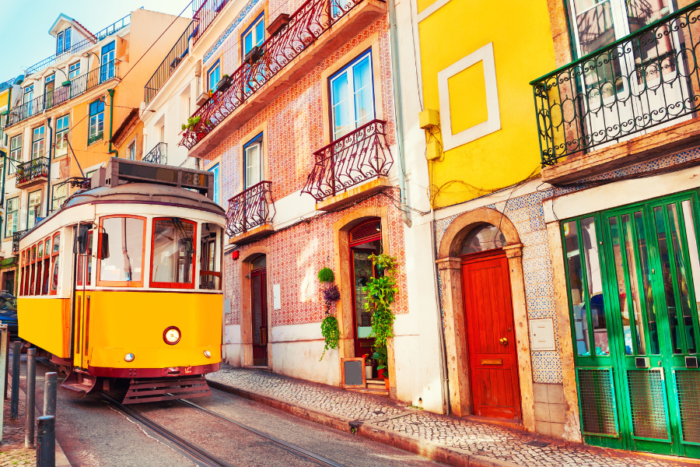
Lisbon’s popularity is undeniable. The city has been a top destination for years – for a few good reasons.
It’s a tech hub with access to venture capital, a notable concentration of talent and flagship events like the Web Summit that draw all the major global players.
Culturally, Lisbon delivers in spades – from the soulful strains of Fado in Alfama to trendy art galleries in Belém and world-class museums.
The culinary scene is just as exciting, with everything from homely seafood restaurants and vast culinary markets to Michelin-starred dining spots.
For those seeking an elegant urban lifestyle, neighbourhoods like Chiado and Príncipe Real offer stylish apartments, while the leafy streets of Lapa offer a quieter, more tranquil suburb.
Finding a one-bedroom place in the city centre could set you back £1,100 to £1,500 or more. Expensive for Portugal, but still affordable in comparison to the rest of Western Europe’s capitals.
That said, day-to-day living – things like groceries, eating out and hopping on the metro (about £35 for a monthly pass) – is far more reasonable than somewhere like London.
Porto
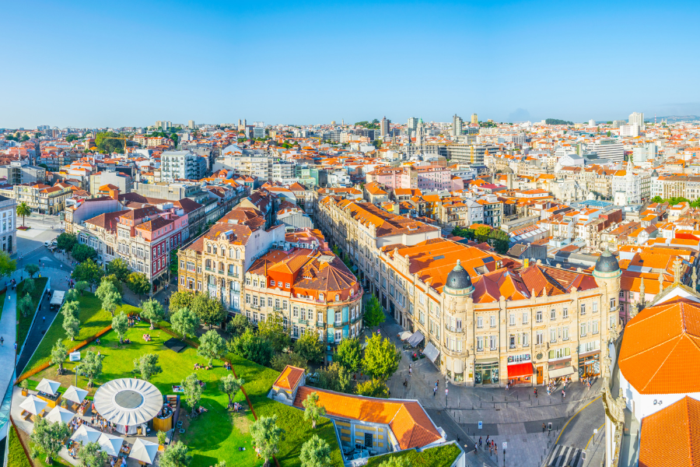
Porto is another great place for digital nomads to live in Portugal and is less expensive than the capital. Generally speaking, it’s around 30% cheaper than Lisbon, especially when it comes to renting.
It works out at around £750 to £800 a month for a one-bedroom in the centre, compared to £1,100 and beyond in Lisbon.
Eating out, grabbing a coffee (or a glass of Port wine) and getting around town tends to cost less.
And with that lower cost, you won’t be giving up on lifestyle. Porto is stunning – with colourful houses tumbling down hillsides to the Douro River, picturesque bridges and white-tiled churches.
It feels smaller, more traditional and more authentically Portuguese than parts of Lisbon, which some people really love.
But be warned, it gets a lot more rain and feels cooler in winter than in sunny Lisbon.
Then, there’s the practical side of working. The internet is generally fast and reliable – fibre-optic is common – with speeds often around 180 Mbps reported.
You’ve got plenty of co-working spaces dotted around the city, too, offering different price points.
Public transport is good, and like Lisbon, you’ll find plenty of people who speak English, especially in the city centre.
It also helps that there’s already a thriving community of expats and digital nomads in Porto. This makes settling in much smoother with a ready-made network for advice, collaboration and socialising.
The Algarve
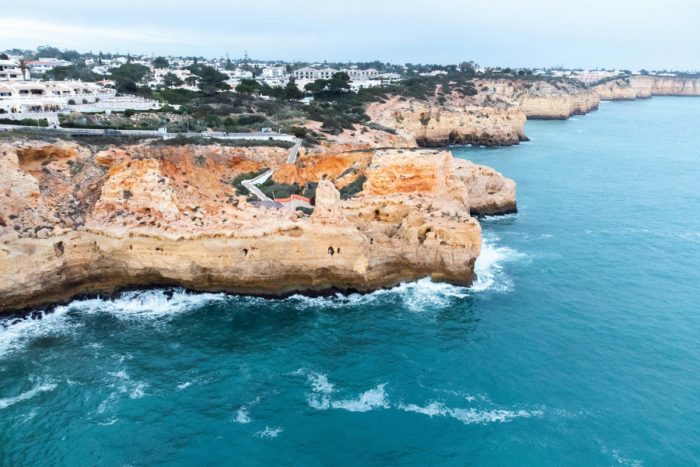
The Algarve attracts digital nomads for many different, but equally appealing, reasons.
In the Algarve, you can expect stunning stretches of golden sand, dramatic cliffs, hidden coves and sunny weather for much of the year.
If your ideal work break involves hitting the beach, surfing, hiking along coastal paths or playing a round of golf, then the Algarve delivers.
In terms of cost, the Algarve is still affordable, especially compared to cities in Northern Europe, though it’s worth noting that prices can fluctuate.
Popular coastal resorts and hotspots have higher rents and living expenses, particularly during peak season. Smaller inland towns remain budget-friendly, but they’ve got a lot less to offer in terms of business amenities.
The region is well-equipped for remote work, especially in the main towns like Faro, Lagos, Albufeira and Tavira. In these areas, you’ll find reliable, fast internet as well as co-working spaces.
The digital nomad community in Algarve is definitely growing, though more spread out across various towns than the concentrated hubs found in Porto and Lisbon.
Madeira Island
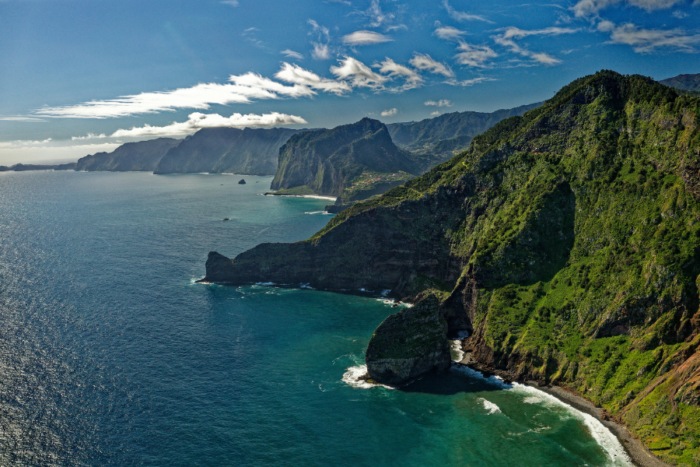
For nomads who thrive on nature, hiking and epic views, Madeira is seriously hard to ignore.
Here, you can expect beautiful volcanoes, steep cliffs, lush tropical plant life and the famous Levada trails – old irrigation channels you can hike along for miles through beautiful scenery.
With its famous ‘eternal spring’ climate, you can also enjoy mild temperatures year-round.
And it’s not all remote nature here – the launch of the Digital Nomad Village in Ponta do Sol put Madeira on the map for remote workers.
This government-supported project created a dedicated hub with free co-working space, reliable Wi-Fi and a packed schedule of community events.
Beyond the pioneering village in Ponta do Sol, there’s a growing nomad presence across the island, particularly in the capital, Funchal. Here, you’ll find more extensive amenities, restaurants, cultural attractions and additional co-working options.
In terms of cost of living, Madeira is generally affordable. While island status means some imported goods carry a premium, overall expenses like accommodation and food are reasonable.
Funchal tends to be pricier than smaller towns like Ponta do Sol or Calheta.
Life moves at island pace, crime rates are low, and the emphasis is on enjoying the outdoors and local culture, which has unique traditions and gastronomy. If trading Lisbon’s cosmopolitan energy for a more laid-back island lifestyle sounds good, then Madeira is for you.
Best Cities in Portugal for Digital Nomads: FAQs
In 2025, you must show that you make a steady monthly income of at least four times the Portuguese national minimum wage. This currently amounts to US$2,600 to US$2,700 per month.
Portugal generally experiences a Mediterranean climate featuring mild, rainy winters and hot, dry summers, especially in the south. The north tends to be cooler and wetter, while coastal regions benefit from Atlantic moderation.
Prepare for administrative processes like obtaining a tax number (NIF) and opening a bank account.
Portugal has an efficient and affordable public transport system. National trains connect big cities, and buses (like Rede Expressos) operate nationwide, while Lisbon and Porto have major metro systems, local buses and trams.
Portugal is known for its relaxed lifestyle, fun culture, outdoor activities and great food. It’s also known for its safety and affordability, though prices are rising in Lisbon and Porto.
Most foreigners live in Lisbon, with Porto coming second and Madeira Island claiming third. Lisbon is popular with other digital nomads and offers plenty of coworking spaces and affordable housing.
Some of the common visas available in Portugal include the Schengen visa or tourist visa, the temporary stay visa, the official digital nomad visa and the Portugal golden visa. Portuguese citizenship is a possibility after five years of permanent residence.
Choose the Best Digital Nomad Destination for Your Needs
Wherever you decide to locate in Portugal, each region promises a distinct way of life.
While Portugal is a good choice for digital nomads, there are plenty of other international options open to you. In fact, there are around 50 nations with digital nomad visas.
Ultimately, the best place is one that aligns perfectly with your personal priorities.
Whatever your reasons, making a successful international move requires smart planning, especially around tax and residency. That’s where we come in.
Our clients are paired with experts in tax, investment strategy, asset protection and immigration to help them create and execute a unique holistic plan. To learn more about how we can help you, get in touch today.


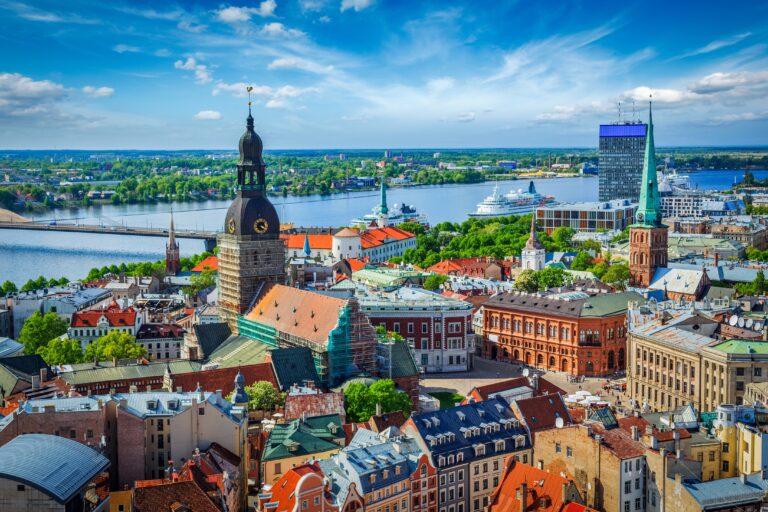
Latvia Real Estate Investment for Expats: Eligibility, Taxes, and Benefits
Purchasing real estate in Latvia is a popular investment strategy for wealthy expats seeking affordable property ownership opportunities that may lead to Latvian residency. The country is known for low investment requirements, minimal restrictions on foreign property ownership, and low property tax rates. In this guide, we will explain the rules for buying Latvia real […]
Read more
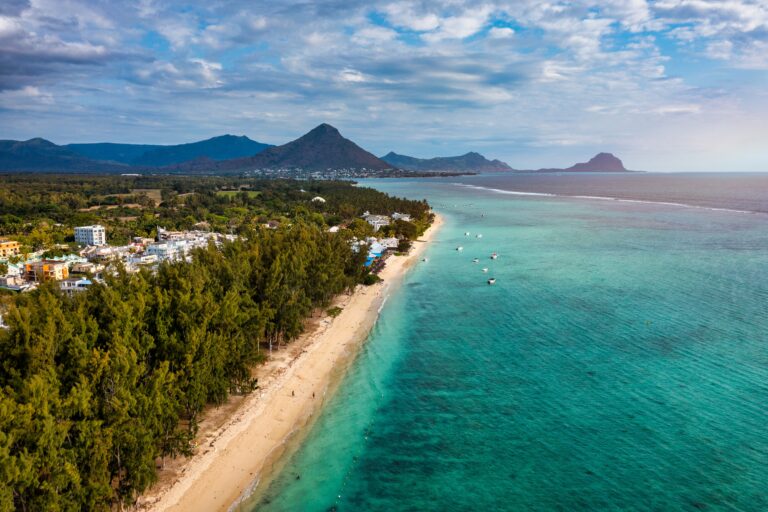
Mauritius Residency Requirements 2026: A Complete Guide
Thanks to its favorable tax policies, political stability, and a relaxed and family-focused lifestyle, Mauritius is one of the premier relocation destinations for high-net-worth individuals. You can get Mauritius residency through one of several residency programs, including those aimed at business and property investors. In this article, we’ll explain the Mauritius residency requirements for each […]
Read more

UAE Golden Visa: Requirements, Application Process, and Advantages Explained
The UAE Golden Visa allows high-net-worth expats to invest, work in, and relocate to the Emirates while benefiting from its zero-tax system and high living standards. There are several paths to the Golden Visa, and understanding which one is right for you can make a significant difference in your residency process. In this guide, we’ll […]
Read more




